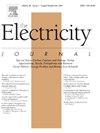Is it worthwhile to participate in transactive energy? A decision-making model for empowering residential customers
IF 2.2
Q1 Social Sciences
引用次数: 0
Abstract
The deployment of transactive energy systems hinges on well-defined policies that govern the decisions of transactive agents. Traditionally, upper-level agents, such as distribution system operators, aggregators, or coordinators, assume perpetual acceptance and participation by lower-level agents, like residential customers, in new demand-side programs. This assumption, alongside the presumption of agents’ benevolent behavior in a transactional environment, often overlooks the potential for false information in electricity markets, leading to significant economic losses and program failures. To address these challenges, we develop a transactive energy system based on mechanism design, structured around four comprehensive phases: Enrollment, Coordination, Execution, and Settlement. Customers adopt a decision-making model grounded in convex stochastic programming, enabling them to freely choose their daily enrollment in a demand response program and define their willingness to coordinate day-ahead electricity consumption once the Enrollment phase is cleared. The payment rule proposed in this work, which includes a penalty policy for energy deviations, ensures truthful information reporting from residential agents to the coordinator within a negotiation environment. Our results demonstrate that residential agents’ enrollment decisions vary according to the penalty values defined by the coordinator. Additionally, the number of customers enrolled in the Coordination phase significantly influences the coordinator’s daily profits. The study also highlights how electricity deviations during the Execution phase can increase customers’ costs beyond initial expectations, emphasizing the importance of adherence to planned consumption for optimal economic outcomes. This research offers a comprehensive transactive energy system that enhances customer participation through the principle of individual rationality and ensures truthful information reporting among agents based on the incentive compatibility concept in a day-ahead electricity market. Then, is it worthwhile to participate in transactive energy? The short answer is yes, and the reasons are unveiled throughout this paper.
参与交互式能源是否值得?增强居民客户能力的决策模型
交易型能源系统的部署取决于对交易代理决策进行管理的明确政策。传统上,上层代理(如配电系统运营商、聚合器或协调器)假定下层代理(如住宅客户)永远接受并参与新的需求方计划。这一假设,以及代理人在交易环境中的善意行为假设,往往忽视了电力市场中可能存在的虚假信息,从而导致重大经济损失和项目失败。为了应对这些挑战,我们开发了一种基于机制设计的交易型能源系统,该系统围绕四个综合阶段展开:注册、协调、执行和结算。客户采用以凸随机编程为基础的决策模型,使其能够自由选择每天是否加入需求响应计划,并在 "注册 "阶段结束后确定其协调日前电力消费的意愿。本研究提出的支付规则包括对能源偏差的惩罚政策,确保居民代理在协商环境中向协调者报告真实信息。我们的研究结果表明,住宅代理的注册决策会根据协调者定义的惩罚值而变化。此外,在协调阶段注册的用户数量对协调者的日利润有显著影响。该研究还强调了执行阶段的电力偏差如何使客户的成本增加到超出最初预期的程度,从而强调了遵守计划消费以实现最佳经济效益的重要性。这项研究提供了一个全面的交易型能源系统,该系统通过个体理性原则提高客户参与度,并基于激励相容概念确保代理之间在日前电力市场上如实报告信息。那么,交易型能源是否值得参与呢?简短的回答是肯定的,本文将揭示其中的原因。
本文章由计算机程序翻译,如有差异,请以英文原文为准。
求助全文
约1分钟内获得全文
求助全文
来源期刊

Electricity Journal
Business, Management and Accounting-Business and International Management
CiteScore
5.80
自引率
0.00%
发文量
95
审稿时长
31 days
期刊介绍:
The Electricity Journal is the leading journal in electric power policy. The journal deals primarily with fuel diversity and the energy mix needed for optimal energy market performance, and therefore covers the full spectrum of energy, from coal, nuclear, natural gas and oil, to renewable energy sources including hydro, solar, geothermal and wind power. Recently, the journal has been publishing in emerging areas including energy storage, microgrid strategies, dynamic pricing, cyber security, climate change, cap and trade, distributed generation, net metering, transmission and generation market dynamics. The Electricity Journal aims to bring together the most thoughtful and influential thinkers globally from across industry, practitioners, government, policymakers and academia. The Editorial Advisory Board is comprised of electric industry thought leaders who have served as regulators, consultants, litigators, and market advocates. Their collective experience helps ensure that the most relevant and thought-provoking issues are presented to our readers, and helps navigate the emerging shape and design of the electricity/energy industry.
 求助内容:
求助内容: 应助结果提醒方式:
应助结果提醒方式:


